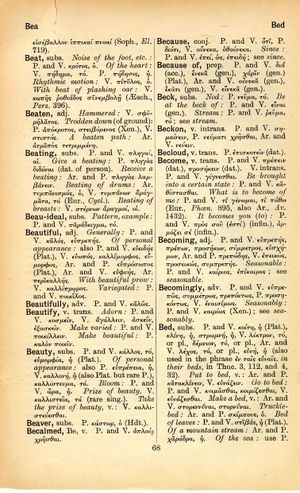become: Difference between revisions
From LSJ
(CSV3) |
m (Text replacement - "<b class="b2">Phœn.</b>" to "Phœn.") |
||
| Line 8: | Line 8: | ||
<b class="b2">Be brought into a certain state</b>: P. and V. καθίστασθαι. | <b class="b2">Be brought into a certain state</b>: P. and V. καθίστασθαι. | ||
<b class="b2">What is to become of me</b>: P. and V. τί γένωμαι, τί πάθω (Eur., | <b class="b2">What is to become of me</b>: P. and V. τί γένωμαι, τί πάθω (Eur., Phœn. 895, also Ar., <b class="b2">A</b>v. 1432). | ||
<b class="b2">It becomes you</b> (<b class="b2">to</b>): P. and V. πρὸς σοῦ (ἐστί) (infin.), ἁρμόζει σέ (infin.). | <b class="b2">It becomes you</b> (<b class="b2">to</b>): P. and V. πρὸς σοῦ (ἐστί) (infin.), ἁρμόζει σέ (infin.). | ||
}} | }} | ||
Revision as of 15:23, 20 September 2019
English > Greek (Woodhouse)
v. trans.
P. and V. πρέπειν (dat.), προσήκειν (dat.).
V. intrans. P. and V. γίγνεσθαι.
Be brought into a certain state: P. and V. καθίστασθαι.
What is to become of me: P. and V. τί γένωμαι, τί πάθω (Eur., Phœn. 895, also Ar., Av. 1432).
It becomes you (to): P. and V. πρὸς σοῦ (ἐστί) (infin.), ἁρμόζει σέ (infin.).

